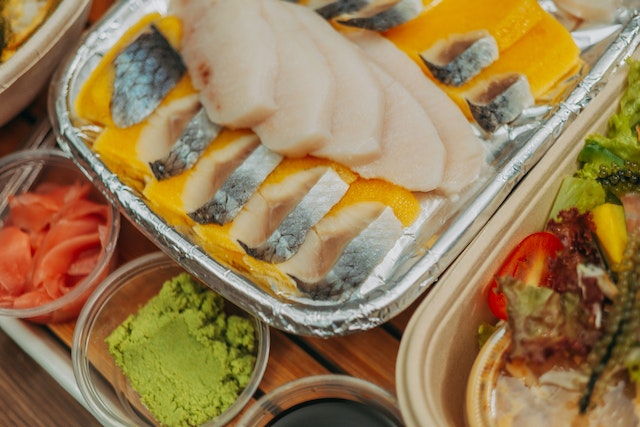
Why do mustard and wasabi make your nose hurt? Mustard and wasabi hurt your nose instead of your tongue and throat because the oil in them turns into a gas.
Spices such as mustard and wasabi affect us in a very different way to chili. When you eat a spicy chili, the capsaicin in the pepper are oily and they stick to your tongue. Capsaicin is a chemical irritant. The capsaicin molecules bind to receptor in the tongue called the vanilloid receptor subtype 1. The capsaicin stimulates the receptor and causes it to send a signal to the brain. This tricks our brain into thinking we are being burned because these receptors are stimulated by heat and abrasion. The capsaicin also has a slow release capacity to make the sensation last a longer time. When you eat chili, the pain signal causes an immune response. The blood vessels widen, which causes the red face, and we sweat because the capsaicin makes us feel warmer. Capsaicin molecules are hydrophobic, meaning they are repelled by water, which is why drinking a glass of water won’t help get them out of your mouth.
So, why do mustard and wasabi make your nose hurt? Why don’t they affect the tongue in the same way? The seeds of the mustard plant and the stem of the wasabi plant contain an oily compound called allyl isothiocyanate (AITC). This is only released when the plant is damaged and the cells are ruptured. So, when the mustard is ground or when the wasabi is cut, or when you chew mustard seeds, the chemical is released. AITC vaporizes very easily. When it hits your tongue, it instantly becomes a gas. This new, lighter gas floats up into your sinuses and irritates the mucous membranes there. We have pain receptors in our nose as well as on our tongue, and the AITC binds with those, sending a signal to our brain. The nasal passage is connected to the eyes via the tear ducts, so when we have the pain from AITC, our eyes start to water as well. It can be very painful but, because it is a gas it dissipates fairly rapidly.
Why have plants evolved to be so spicy? Chili plants and mustard plants have evolved this ability for the same reason. Both chili peppers and mustard and wasabi want to stop animals eating them or their seeds. The capsaicin in chili affects all mammals, so they very quickly learn that they can’t eat the plant. However, birds are completely immune to capsaicin, so they can eat as much as they want. Birds don’t have the same pain receptors in their mouths as mammals do. Why would this be an advantage for the plant? There are three reasons. The first is that animals have teeth and birds don’t. Animals are far more likely to chew up the seeds of a plant than birds are. The second reason is that birds can travel a much greater distance than a mammal can and the goal of any plant is to spread itself as far as it possibly can. The third reason is that seeds that pass through the digestive system of a bird are 370% more likely to germinate than seeds that do not pass through a bird. To make sure the birds eat the fruit at the right time, chili peppers turn red when they are ripe. Birds are attracted to the color red, while mammals tend to be deterred by it. The outer layer of the pepper also reflects ultraviolet light, which only birds can see, when it is ripe.
What about mustard? Mustard has evolved seeds that are spicy to discourage animals from crunching them. Mammals can eat mustard, so long as they don’t crunch it, but that is not the main reason that mustard and wasabi evolved the ability to release AITC. That comes down to insects. We like the spiciness that comes with mustard, but to insects it is toxic. When insects, such as caterpillars, bite into mustard, or wasabi, the gas is released and kills the insect. However, that is not the end of the story because over millions of years, some insects have evolved the ability to survive the AITC gas. This meant that the plants had to evolve a greater level of toxicity, and so on. If we had eaten mustard millions of years ago, it probably wouldn’t have been anywhere near as spicy as it is today. And this is what I learned today.
Sources
https://edu.rsc.org/everyday-chemistry/why-chilli-burns-your-mouth/4014152.article
https://www.labroots.com/trending/videos/11614/why-are-peppers-spicy
https://www.sciencedaily.com/releases/2012/08/120830141335.htm
https://en.wikipedia.org/wiki/Capsaicin
https://eugene.wbu.com/birds-and-hot-pepper
